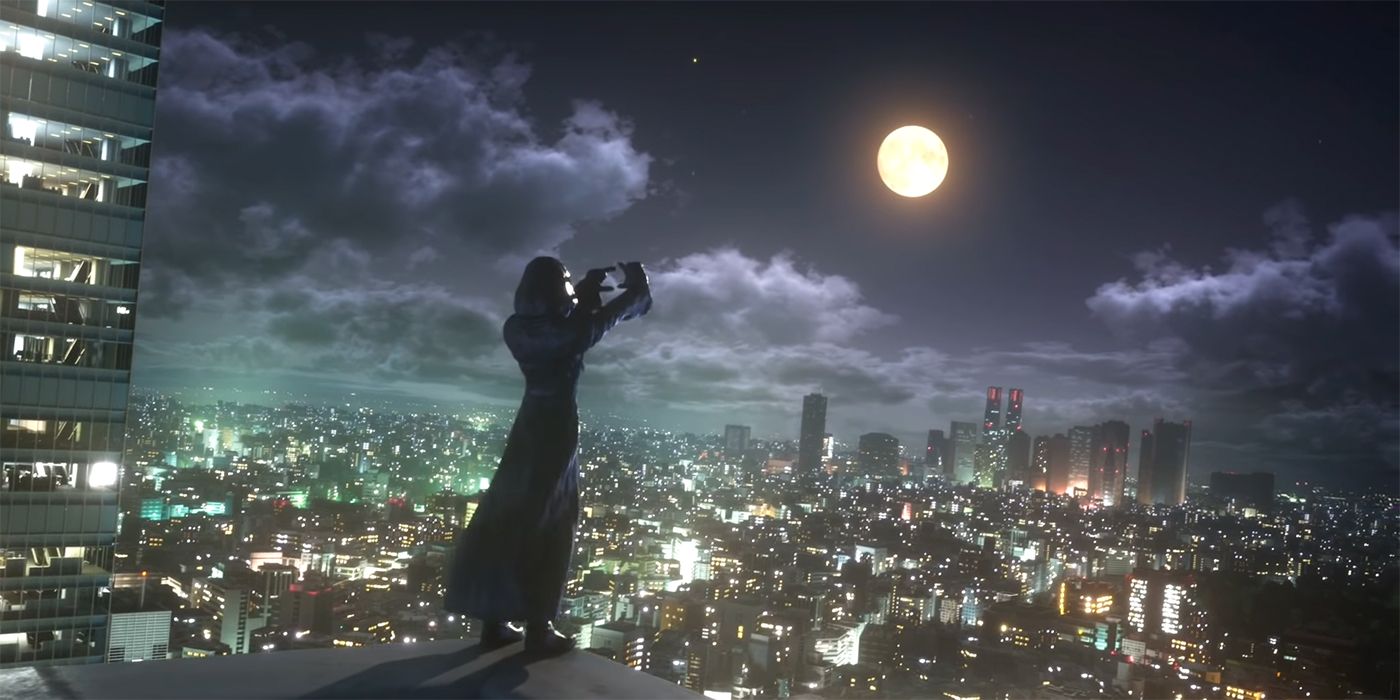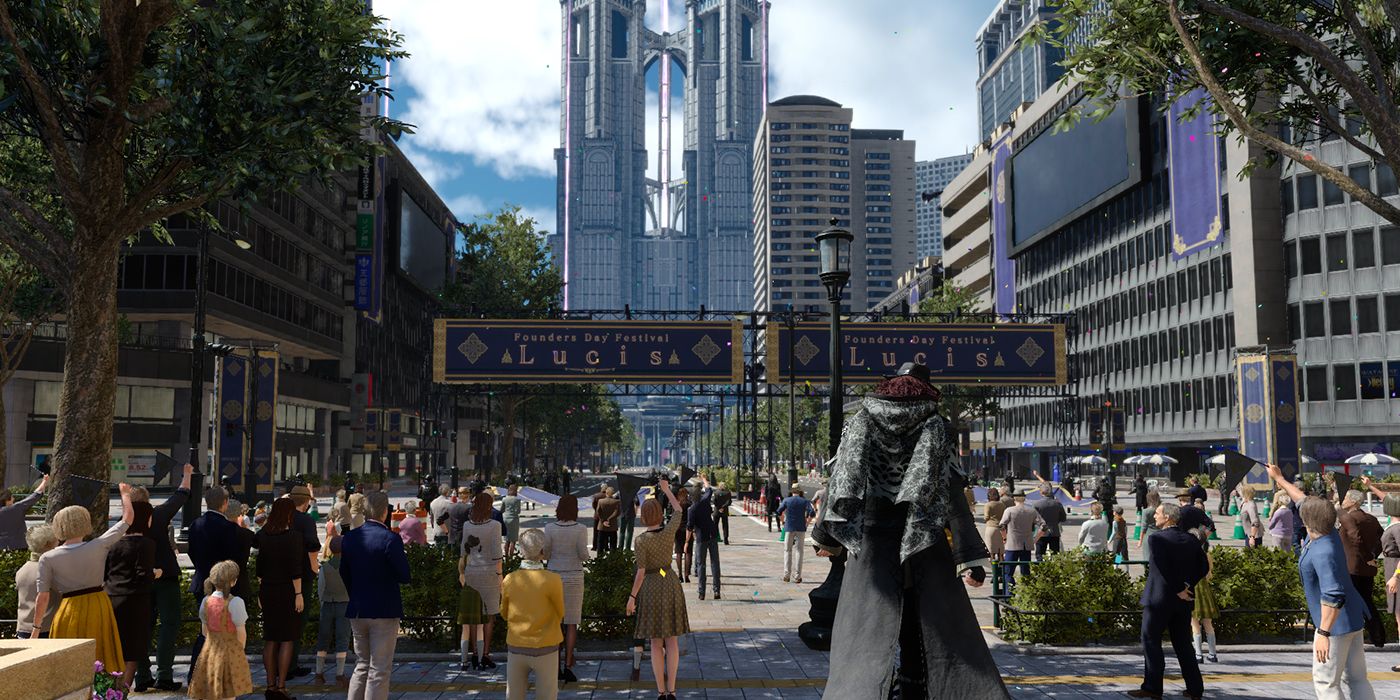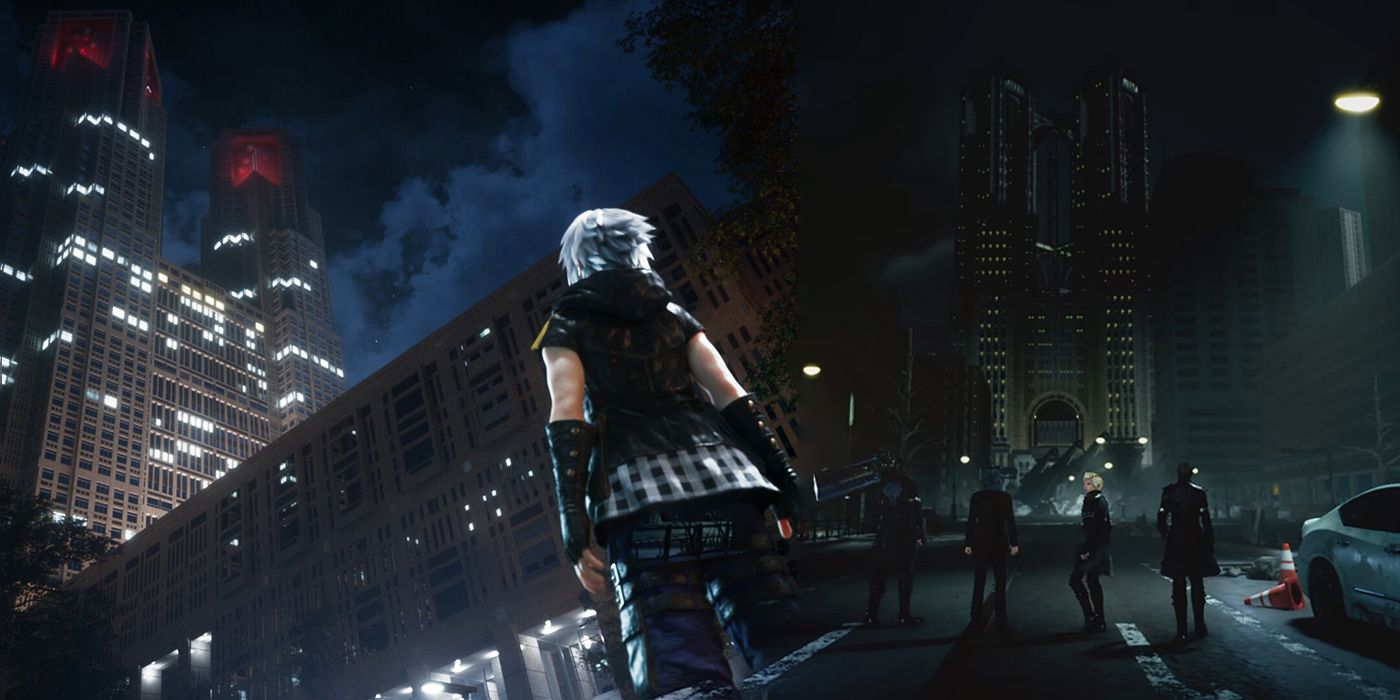Comparing Kingdom Hearts 4's Quadratum to FF15's Insomnia

By the end of Melody of Memory, the culmination of Kairi's adventure seems to be setting up the next big chapter in the Kingdom Hearts universe. After diving into her memories, while the player relives some of the series' best musical compositions, fans were treated with plenty of Kairi-focused exposition regarding Sora's disappearance. Apparently, Sora's sacrifice to save Kairi at the end of Kingdom Hearts 3 Re Mind has sent him deep into the "world of fiction." Trapped somewhere between the realms of light, dark, and dreams, a towering city named "Quadratum" is supposedly where Sora resides. Quadratum being very reminiscent of Final Fantasy 15's Insomnia.
Final Fantasy fans were quick to point out the similarities between Kingdom Hearts 3's secret ending and the "Crown City" from Final Fantasy 15. Whether it was the "Somnus" musical cue, or the parallel towers atop of which Yozora sits, it's clear that the city of Quadratum in Kingdom Hearts was inspired by Insomnia. Although the city could more accurately be described as similar to Final Fantasy Versus 13's Insomnia, for the sake of the comparison, they will be considered one-and-the-same. As Tetsuya Nomura transfers the concepts of Insomnia into what could be Kingdom Hearts 4, there's actually some pretty significant differences between each city.

Towering dark skyscrapers, bright neon lights, cars lining the streets, there's only been one world like that in Kingdom Hearts previously. However, Quadratum is nothing like the world of San Fransokyo from Big Hero 6. It's far less colorful and full of life compared to Baymax's world, in fact it's completely devoid of life in comparison. The only character who seems to call Quadratum home is Yozora, the fictional "commander" from Verum Rex who's true identity/purpose is unknown. There's also the unknown star, who finds herself at the End of the World in Kingdom Hearts 3, but their identity is still unknown.
There are a lot of theories as to what the "world of fiction" in Kingdom Hearts truly is. As a direct translation of the name "Quadratum," the anglicized version of the name is "Square." Fans have interpreted that in ways ranging from conspiracy-level hype to calling bull, but so far there's no hardcore evidence suggesting the true meaning of the city's name.
Some have taken it as a literal manifestation of a Final Fantasy-specific world in Kingdom Hearts, taking "Square" as a reference to Square Enix itself. Others feel it's name may have an unknown significance yet to be revealed. The only likely possibility is that Quadratum is going to be Kingdom Hearts 4's setting, at least, that much is made evident from Melody of Memory's ending. Regardless, Quadratum is certainly unusual compared to even the strangest Kingdom Hearts original worlds. Not because it's so different from any original world, but because it's surprisingly contemporary next to other original Kingdom Hearts worlds.

On the other hand, the very core design of Final Fantasy 15 as a whole was meant to be contemporary. Since the 15th game in the franchise was dubbed the "fantasy based on reality," Insomnia was basically a modern equivalent of a medieval-style kingdom. For every example of contemporary society found in Final Fantasy 15's Insomnia, there's one example of a fantasy aesthetic that harkens back to traditional Final Fantasy worlds. Modern cars are stopped in parking spaces next to regal, gothic-looking statues evocative of Final Fantasy's typical aesthetic flair. Insomnia's two towers in the Citadel symbolize the modern kingdom of Lucis, as well as Noctis' lineage.
Noctis' story largely prevents players from visiting the city for obvious reasons: Niflheim breaks peace with the Kingdom of Lucis and sacks the kingdom, all while Noctis is begins his journey. Players at most get small glimpses of the city until they return to the now-destroyed Insomnia at the final act of Final Fantasy 15. Only glimpses of the city are shared prior, but Final Fantasy 15's Episode Ardyn DLC does provide a longer look at pre-invasion Insomnia. Noctis does eventually reclaim his kingdom by the end of the game, but at that point Insomnia is far beyond its prime. Very few moments do players get to explore Insomnia, but it's still a big part of Final Fantasy 15.

Now, there are specific caveats that can explain why Quadratum and Insomnia are aesthetically similar. Both cities are largely the brainchild of Tetsuya Nomura, creative director behind both Final Fantasy Versus 13 and Kingdom Hearts 3. Tetsuya Nomura eventually left the Final Fantasy Versus 13 project as director to work on Kingdom Hearts 3, but Final Fantasy 15 adapted much of the Versus 13 conceptual work by Nomura. When Final Fantasy 15 director Hajime Tabata took over the project, Insomnia was left largely untouched, despite its direct presence in the game's story being minimized. That's why the two metropolitan areas look very similar.
However, in the context of both games, Quadratum is likely going to be very different compared to Insomnia. It's only possible to speak hypothetically on Quadratum currently, but Kingdom Hearts has already emphasized this city as very important narratively and physically. Not only could it possibly be the next main setting of Kingdom Hearts 4 and/or another Kingdom Hearts spin-off, but Sora and Riku's presence there means the setting's story is also important. Insomnia was the opposite of that for almost the entirety of Final Fantasy 15's runtime. The immediate future of Kingdom Hearts seems to rely heavily on Quadratum and its related storyline.
A Kingdom Hearts project is reportedly in development for 2022.

Post a Comment